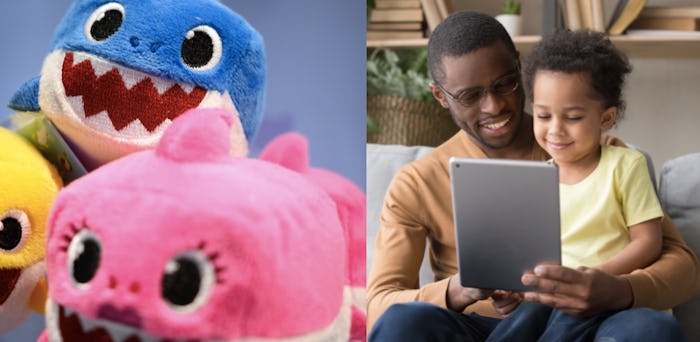Life

How "Baby Shark" Is Helping Dads Bond With Their Kids
All it takes is a few "doo doo doo doo"s to give me what can only be described as a monumental headache. Like most parents, I am not what one would consider to be a "fan" of "Baby Shark", the uber-popular song-turned-concert series-turned-show-turned bonafide worldwide phenomenon, haunting parents' dreams since 2016. But there's a benefit to all that baby, daddy, mommy, grandma shark talk, annoying though it may be: "Baby Shark" is helping dads bond with their kids.
Dignity Health, one of the largest hospital systems in the United States, surveyed 1,004 dads with children under 18 who report listening to music with their children. The survey found that 50 percent of dads with kids under 5 listen to music every single day as an activity with their children, according to a press release. The same survey also found that 61 percent of dads report feeling "more connected" to their children when they listen to music together, and feelings of happiness and connectivity increase the more often they listen to their favorite jams.
And which song was among the most popular songs dads are listening to with their kids? You guessed it: "Baby Shark." It was number three, in fact, behind “Natural” by Imagine Dragons and "Don't Stop Believin'" by Journey.
While "Baby Shark" might appear to be basic to a mind-numbingly annoying degree, it's the basic, predictable musical pattern and repetition that makes the song not only popular, but beneficial... for both parent and child.
"Repetitive sing-along songs can improve language development and listening skills when children are very young," Dr. Danton Kono, pediatrician at Dignity Health Mercy Medical Group practicing in Sacramento, California, tells Romper. Kono says "Baby Shark" is easy for children to memorize because it's so repetitive, and because it's easy to memorize it can be fun for children to sign along to.
Maureen Healy, author of The Emotionally Healthy Child and child development expert at Growinghappykids.com, agrees. "Repetitive songs are enjoyable because young children learn the words, hand gestures, and know the ending is a happy one," she tells Romper via email. "This provides comfort and security in what sometimes seems a scary or not-so safe world." Healy says that while parents often hate these repetitive songs, they are a necessary part of learning and healthy development for our children.
The goal is to recognize the child you have, and what he or she likes to listen to.
It's not only the repetitive nature of the song, but the words in "Baby Shark" that are helping parents and children bond, Healy says. "They are acting the song out with hand gestures, moving their bodies, and identifying their roles (baby shark, mommy shark, daddy shark) as well as experiencing life as an adventure," she says. Helping children identify their role within a family, and pinpointing who they can constantly rely on (mom and dad, grandma and grandpa, etc.), all works to instill a sense of security and safety.
A 2018 study from the University of Arizona, and published in the Journal of Family Communication, found that children who grow up listening to music with their parents report having better quality relationships with their moms and dads later on in adulthood. "Music is a wonderful way to bring the family together," Kono says. "And any music that brings joy to both the child and parent is beneficial."
So, do us parents have to constantly be playing "Baby Shark" in our homes in order to feel closer to our kids? Absolutely not... thankfully. But playing and listening to music — whatever kind of music that may be — with our children is beneficial, especially if we choose the appropriate moments to do so.
"There is no magic music formula," Healy says. "The goal is to recognize the child you have, and what he or she likes to listen to. Play it at the appropriate times (perhaps bedtime, or when needing to relax) and enjoy the time spent together listening to music."